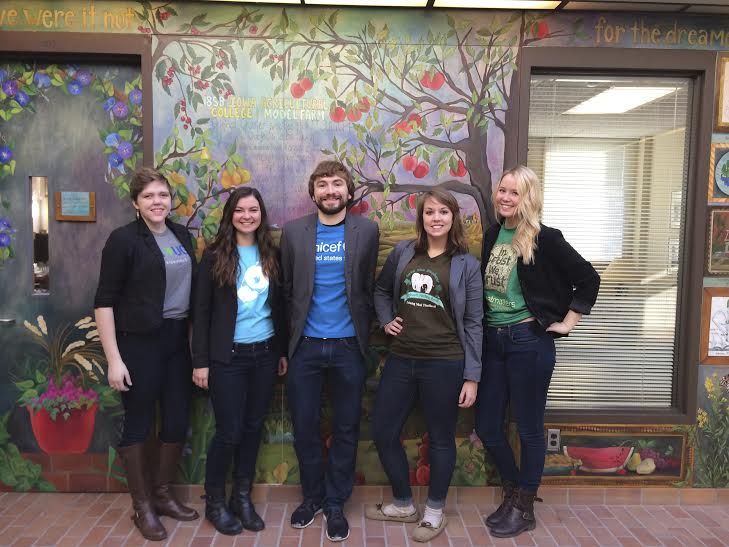ISU students attempt to ‘uproot the status quo’
The Gung-Ho Globies, left to right, Alexandria Wilson, Mikayla Sullivan, Clayton Mooney, Elise Kendall and Ella Gehrke.
January 22, 2015
Imagine a device that could help reduce food waste while improving nutrition across the globe. A tool that is efficient, portable and easily accessible to citizens living in some of the world’s poorest countries.
Five ISU students imagined such a tool and their creation has earned them a trip to Portugal and a chance to win $10,000 in the 2015 Thought for Food Challenge.
Founded in 2011 by Christine Gould, senior public policy manager at Syngenta, the Thought for Food Challenge is an annual competition for teams of university students across the globe to “uproot the status quo” by presenting innovative solutions for feeding Earth’s growing population.
In September 2014, Mikayla Sullivan, a then-sophomore in global resource systems, organized a team with her fellow global resource systems students called the Gung-ho Globies.
Students in global resource systems who volunteered for the team include seniors Clayton Mooney and Elise Kendall, sophomore Ella Gehrke, and Alexandria Wilson, freshman in animal science.
Together, the five created KinoSol, a personal food dehydrator with unique capabilities. And out of 336 entries from 51 different countries, the Gung-ho Globies team was one of 10 chosen to attend the challenge.
“The main point of the project is to come up with an idea and make it innovative and new,” Gehrke said. “We thought, ‘it needs to be mobile and sustainable, so we need to make it solar. We can’t use electricity and we need to have storage capabilities.’”
The team designed KinoSol to be completely solar powered and easily attachable to a bicycle, one of the most common forms of transportation in the developing world. This “multi-functional, triple threat” device, Gehrke said, is meant to connect farmers, while reducing post-harvest loss.
“One-third of all the food in the world goes to waste,” Gehrke said. “In the developed world, it’s on the plate, while in the developing world, it’s rotting on the vine.”
Some teams in the competition are presenting products involving complex technology, but the Gung-ho Globies wanted their product to be easily accessible to farmers, especially women, in the developing world.
“It doesn’t look like a sparkling new machine,” Wilson said. “So we think it’s going to be more culturally accepted.”
KinoSol users are able to place excess produce in the device’s built-in drying trays. A few hours later, the dehydrated produce can then be stored in an attached compartment lined with Mylar, which prevents pests, moisture and light from entering.
Farmers and families will use KinoSol to “increase their produce haul,” Mooney said. This will provide them with more food and eventually, a way to make money.
So far, the Gung-ho Globies have constructed two prototypes of KinoSol, and they recently recruited students in agricultural engineering to help build a third.
“It’s been really nice just seeing how supportive the whole College of Ag has been,” Sullivan said. “Even professors we don’t know said, ‘Yes, we’ll help with anything you need.’”
They have also solicited the help of professors and students in business and marketing to learn how to “pitch” their product for the judges. KinoSol’s slogan? “No waste, more space, easily brought from place to place.”
The Gung-ho Globies will present KinoSol at the Thought for Food Challenge in Lisbon, Portugal on Feb. 13 and 14. If they win, they will receive $10,000 in start-up funds to develop a business plan and begin manufacturing KinoSol.
“This is showing a new side of agriculture,” Wilson said. “This competition is showing [that] agriculture is a lot more than the traditional farmer. It’s networking, engineering, innovation.”
But for the Gung-ho Globies, the end goal isn’t a cash prize.
“Once we see the impact we can make, we’re not going to stop,” Gehrke said.
Win or lose, the group plans to begin field testing KinoSol and collecting data. They hope to take the dehydrator to rural Uganda, through the Center for Sustainable Rural Livelihoods at Iowa State.
“Thought for Food’s slogan is ‘uprooting the status quo,’” Gehrke said. “We have these problems, and, unless we uproot the status quo, we’re not going to see any change.”







